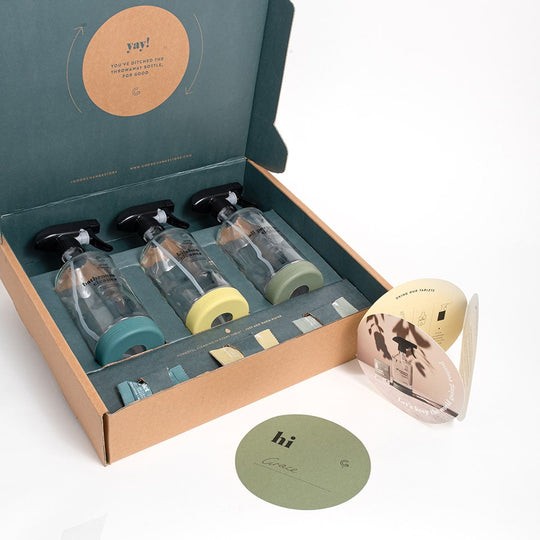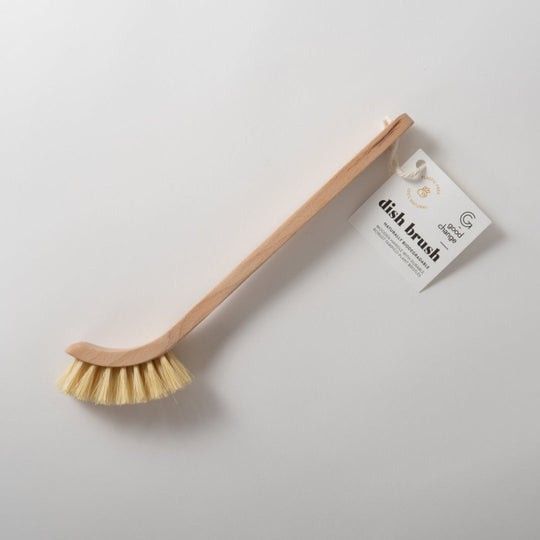NBR Article: Tauranga company offers a Good Change from one-use spray cleaners
Kristy Hunter and Stine Smith have just signed a deal for their products to appear on the shelves of Woolworths Australia


Journalist: Dita De Boni
2015, household cleaning supplies and consumer chemicals behemoth SC Johnson released a Windex concentrate into the US market that could be poured, with water, into an existing spray bottle and used, saving another single-use plastic receptacle from a perpetual lifespan cluttering up a landfill.
The product failed, because it was in those days so much easier to simply buy another bottle of window cleaner rather than take the extra step of buying a product to make up with water.
But much has changed in 2024 – ‘single-use plastic’ is a dirty phrase for mindful consumers, most countries have signed on to reduce plastic packaging, and in Europe, refillable everything from food to cleaners to food and drink is increasingly popular. Given that spray cleaners are around 90% water, which is expensive to ship around and the bottles environmentally ruinous, solutions that nudge consumers away from the single-use product, particularly in Europe, are flourishing.
Around four years ago, New Zealand companies started looking at refillable cleaning products as well. One of those companies was Cleanery, which is still going strong and now sold into the US, while another established around the same time was Good Change, founded by two Tauranga women on a similar mission to revolutionise the cleaning market (albeit with a tablet rather than Cleanery’s sachets).
Kristy Hunter and Stine (‘Steena’) Smith, both mothers of three, had met through friends (Smith, from Denmark, had married a Kiwi and was new to New Zealand) and bonded over their loathing of plastics and toxins. They saw a gap in the local market.
“We walked the aisles of supermarkets and saw all the categories in the supermarket seemed to have sustainable options, but the cleaning category hadn’t changed since the 1990s,” Hunter told NBR.
“It was completely dominated by the likes of Chux and Scotch-Brite and some of those plastic-infused products, and they were all wrapped in soft plastic – we could see a really clear gap for a sustainable product that we could deliver into supermarkets at an affordable price, but also make it look good. That was sort of the start of it.”

It just so happened that Hunter had made the jump out of full-time mothering and was in the process of establishing her own business – a natural bench spray company.
She’d had it formulated and designed before Smith approached her with a cloth she’d used in Denmark made of wood, pulp and cotton that was “functionally amazing” and genuinely compostable.
Settling on the cloth as the first product of their new company Good Change, they got it certified as compostable in Switzerland, and decided to sell it into New Zealand.
The product met the women’s three ‘pillars’ – it was sustainable, looked good, and was affordable (about $8 for three of the medium reusable cloths).
The pair took an unusual route to getting their cloths on the shelves of Foodstuffs supermarkets.

“We’d walk down each supermarket aisle, a box of cloths under our arms, look at the shelves, see the gap, take a photo, scuttle upstairs to the buyer and do a two-minute pitch, and they’d cut it in on the shelves (‘cutting it in’ is an FMCG term meaning adding a new product), and we’d move on to the next supermarket,” Hunter said.
On one day, the women managed that with eight consecutive supermarkets, ringing their husbands in between stores to run them down more stock (“we need a trailer!” a husband said at one point).
The women also favoured in-store demonstrations where they could talk face-to-face with consumers.
“It was like a focus group that was really powerful, because we found out exactly what it was that they wanted for our next product. "
"We'd have a whole lot of men come up and say to us ‘love your cloths, but they’re too small for my hands’ for example – the next product we did was a larger version of the cloth.”
Expanding the range
More products followed as the women found gaps they could fill. A roll of bamboo was next – prompted by their in-store interactions in which customers would come up and ask if they could produce something that rivalled the Chux rolls of bluecloths, which are made of viscose rayon fibres. The bamboo cloths are the same idea but can be used up to 85 times as a dishcloth, a serviette, cosmetics remover or. even a baby wipe.
The product is now Good Change’s biggest seller

After that came a scourer that is soft enough to be an exfoliator, a multipurpose wooden dish brush, and tablets and refillable cleaner bottles. Naturally there are even more products in the pipeline, including some for laundry, as well as possible additions to the hand soap, floor cleaner and dishwash categories.
Within four years the women have managed to generate revenue of more than $1 million for their products, which are stocked in all Foodstuffs supermarkets, and recently inked a deal with Woolworths Australia that will increase their turnover to about $3m once all the 635 stores in the network adopt the products (Good Change is hoping that will also see the products stocked in Woolworths NZ).
Hunter said the company was profitable but almost all of that goes back into new product development and stock; it had just hired another person to make three full-timers and three part-timers working in the business.
Australia
Hunter is enthused about her company and even more so about what it might achieve in Australia.
The company has been bootstrapped up until this point but is now readying pitches for investors with which to properly take on Australia – not just into supermarkets but into ‘eco independents” (Good Change products are already in 550 of these but they see more scope in baby stores and outdoor and nautical stores among others). Hunter reckoned she’d need about $1m to properly launch into Australia, with zero-waste beauty brand Ethique’s founder Brianne West telling her for a PR campaign alone she’d need at least $200,000.
There has been interest in the company from bigger players, although Hunter refused to name them.
“We have had a reasonable size FMCG company who about two years ago said‘ streamline your supply chain, and get into Australia, and then come back and talk to us’. And they are our dream sort of business because they're not only able to help us fund the next stage of the journey, but they can open channels of distribution as well – they’re in around 27 countries around the world.”
“I'm wanting to fast track this; Stine is keen to get Australia established first, which is fair enough; in the background we're starting to make plans for the US, probably the West Coast of the US to start with.”
Lessons
There have been a couple of steep learning curves the founders of Good Change have had to experience as they transition into FMCG company founders.
Stock control is one of the biggest. “It's a very fine balancing act and juggling act between keeping production costs down but making sure you get enough product on the ground to service your customers – cashflow can be tricky,” said Hunter.
The other lesson was finding the right distributors. Getting a big distributor of the products slowed down growth for the company last year when they got lost in the mix. A distributor buys the products, and then sells and delivers them to buyers up and down the country. But the women now use an agency model of distribution, which sees reps sell the products to outlets but the product ships from the Good Change warehouse, allowing the company to keep close tabs on the products and data.

The founders feel they complement each other and are aligned on the vision for the company, which they revisit every three months. They are committed to "good works", being saving hundreds of thousands of bottles from landfill, providing clean water in Cambodia or classroom education about the dangers of plastic waste.
Hunter said the company was inspired by Ethique’s West.
"She came from a science background and she has managed to build an incredible business ... she's very authentic and very real," said Hunter.
"Given that science background, she was very particular about making sure that she could put a very honest product on the shelves – she's probably our vision of the pinnacle of where we'd like to be."
All content belongs to NBR and is not Good Change's creation.
That wraps up today's chat! Before you head out, take a moment to explore our online collection. See firsthand how our vision has influenced our incredible array of products. Enjoy looking around!

Bottle for Good™ Starter Box
You deserve a spray bottle that delivers exceptional performance & looks great.

Eco Cloths
Our Award-Winning Eco Cloths are the dish cloth you've been waiting for! Designed to be displayed!

Wooden Dish Brush
At the intersection of nature and great design, you get our dish brush!
Did we mention sustainable?


